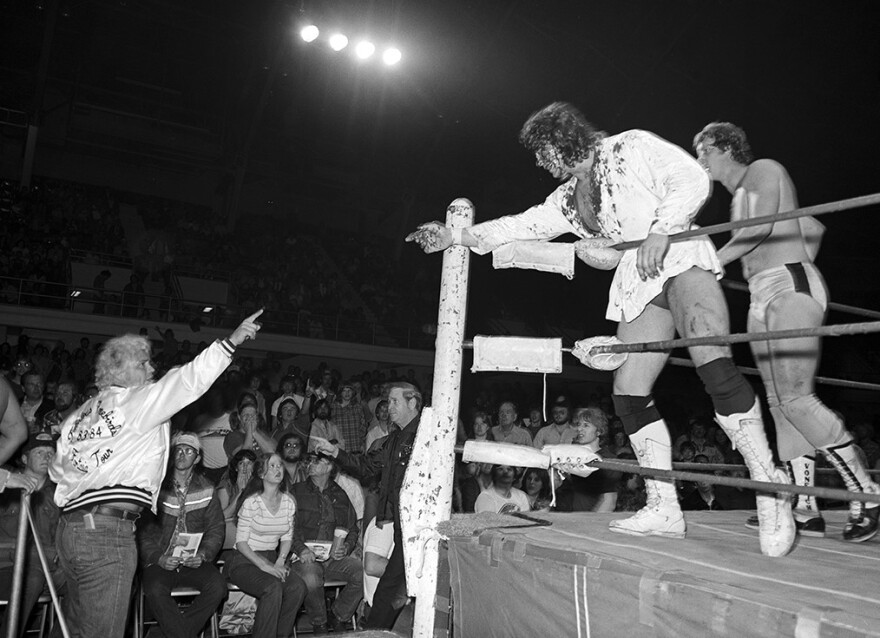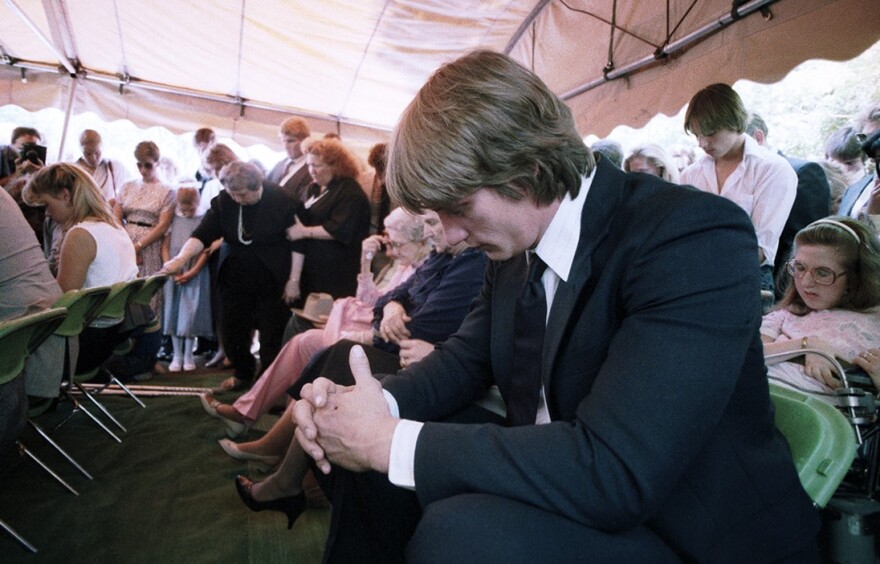The new film, The Iron Claw, follows the famous — and tragic — Texas family of professional wrestlers, the Von Erichs. KERA's Jerome Weeks talked with columnist Bud Kennedy, who was the Fort Worth Star-Telegram's sports editor in the early '80s.
This conversation discusses suicide. If you or someone you know may be considering suicide or is in crisis, call or text 988 to reach the Suicide & Crisis Hotline.
The heyday of the Von Erichs — the father, Fritz, and his sons — that was back in the '80s. That's when the brothers, Kevin, David, Kerry, Mike and Chris, they became beloved wrestling icons nationwide. So how did that even happen — because this was well before the WWF made wrestling a global cable kingdom?
Bud Kennedy: Wrestling became popular as television became popular. Television stations could stage it in the studio and air it late at night on Saturday and have an hour and a half of wrestling that was in-studio. They didn't have to go out on remote for it. So the rise of wrestling popularity grew with the rise of television itself as something that was content for a local television station.
That was when wrestling was small-time and local. So how did the Von Erichs become a state-wide phenomenon, then Southwest and finally nationwide — all of this pretty much pre-Vince McMahon?
Fritz was kind of the Ted Turner of Texas wrestling. [Ted Turner created CNN and other early cable TV programming.] He had been in wrestling for 25 years. So he had his own network [Fritz — real name: Jack Adkisson — moved what was called the World Class Wresting Championship to Dallas]. He had his own promotion. He had everything in the Southwest and knew every town and every matchmaker. And everything, every card [evening match-up of opponents] in the Southwest had to go through Fritz.

You saw them wrestle here?
Will Rogers Auditorium. Texas Stadium. I saw them at the Cotton Bowl in October 1985. I remember this. Gino Hernandez tried to escape [Hernandez was a member of the Fabulous Freebirds, the Von Erichs' regular opponents in a long-running, professional feud]. But he was tackled by young Chris Von Erich, who was sitting at ringside, and Gino had his hair shaved, shaved bald in front of the crowd. His hair grew back in two months. But this is all part of the show — they were 'hair matches' where the winner gets to shave the loser.
That was the kind of trade-off — you know, to keep the feud going. You win, then I win, and then we start all over.
What about the Sportatorium?
The Sportatorium was just a sensational place to go and see them. Fritz ran it, and there wasn't a bad seat. It was just this old wooden box, with wood seats, and it smelled of French fries, and corn dogs and cigarette smoke. It smelled like if you took the State Fair and crammed it all into a little old wooden box.
So their father Fritz could really book and promote his sons. And to get attention, all of wrestling has these larger-than-life characters, villains vs. heroes. It's kind of a primitive Marvel Cinematic Universe. Fritz had been a bad guy in the '50s, but his sons, the Von Erichs, were definitely good guys.
But there're lots of good guys, why did they stand out?
You have this talented brother-trio, and they're a perfect tag team match. They were a great complement to each other. You have tall, handsome David. You have a really long- haired, just strong, ripped-muscle, a statue of a figure in Kerry. And then you have the kind of quick-on-his-feet Kevin.
And I think they knew everything about wrestling from their father. They were iconic Texans -- like the Cowboys. Like Dr Pepper. Like J.R. Ewing. They were as much a Texas icon as anything in the state.
But for people who weren't here then, what did that mean — being a Texas icon?
In the '80s, there was this fascination with everything Texan. Urban Cowboy came out in 1980. Dallas was on TV.
And they were just the iconic Texans, and so everything about being young and strong heroes -- the Von Erichs, they summed it all up and brought it to the ring.
But then the tragedies started. David died of a possible drug overdose in Japan. That meant Kerry took on the burden of being team leader. It was a burden that increased when he lost a foot in a motorcycle accident but kept it secret from the public.
Yeah, so Kerry kept this horrible secret for all these years, and then eventually fell victim to that, and then you have the horrible cascade that begins in so many families where once one person commits suicide, if the rest of the family doesn't immediately renounce it and say, 'Never do anything like that to your loved ones or your family,' then it just becomes like dominoes falling.

We don't know how the movie, The Iron Claw, handles the whole issue of suicide. The trailer never mentions it, but you constantly hear "Don't Fear the Reaper," the famous Blue Oyster Cult song about suicide. But the fact is, three of the sons, Mike, Chris and Kerry, all killed themselves.
The procession, one by one, it just became more heartbreaking. And I don't know how much of this was attributable to the rampant drug use among wrestlers in the '80s. Certainly, steroids and some of the medications used then may have led to depression. But I don't know the details.
Now I have to ask. The movie, The Iron Claw, is named after Fritz' secret, wrestling move. So what in the world was the 'iron claw'?
You know, all the wrestlers have this magical, mysterious way of winning that's never fully explained.
It would be his 'finishing move.' Like, they would have a little pocket in their trunks, and they would have a secret vial of 'danger dust' or something that they would blow in the eyes of their opponent. It would blind them and they'd finish them.
Fritz' iron claw was just he'd grab the forehead of his opponent, and supposedly Fritz' grip was so strong that it would bring any man to his knees.
So the iron claw was just the finishing move.
The Iron Claw will have its world premiere at the historic Texas Theatre in Dallas on Wednesday, Nov. 8. Fans can enter for a chance to win access to the world premiere’s fan zone and watch the stars arrive on the red carpet. The film will open nationwide Dec. 22.
Got a tip? Email Jerome Weeks at jweeks@kera.org. You can follow him on Twitter @dazeandweex.
KERA Arts is made possible through the generosity of our members. If you find this reporting valuable, consider making a tax-deductible gift today. Thank you.


